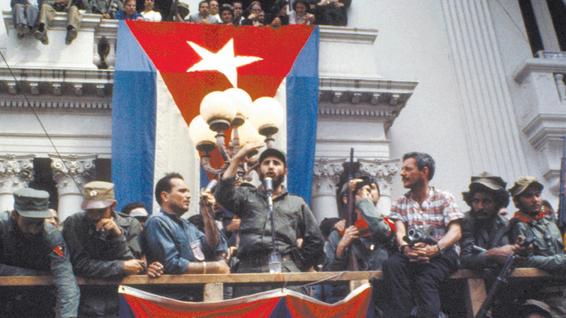France: An explosive situation; Huge protests against pension law

September 7 rally of 1.1 million in Paris after the pension changes were presented in parliament by Sarkozy’s labour minister. Photo: Wagingnonviolence.org.
By Sandra Demarcq
October 11, 2010 -- International Viewpoint -- The political situation in France is dominated by the mobilisations against the proposed "reform" of the pension system [that will dramatically reduce the right of workers to access pensions]. This is at the heart of French President Nicolas Sarkozy’s austerity policy. Although it is presented as an obvious demographic necessity, it is meeting increasing opposition in public opinion.
Photo essay: Bangkok, 10-10-10 -- Red Shirts mass around Democracy Monument
Story by Peter Boyle, photos by Klaus.
Mondragon: A path to 21st century socialism?
By Louis Proyect
Ecuador: Coup defeat reveals Correa's strengths and weaknesses

Supporters rally in support of Ecuador's President Rafael Correa.
By Duroyan Fertl
October 8, 2010 -- Green Left Weekly -- The attempted coup d’etat in Ecuador on September 30, 2010, against the left-wing government of Rafael Correa was defeated by loyal troops and the mass mobilisation of Correa’s supporters. The event underscores the turbulent history of the small Andean country. It also reveals some of the weaknesses of Ecuador’s revolutionary movement, which is part of a broader Latin American movement against US domination and for regional unity and social justice.
The coup attempt was led by a small core of police and soldiers, whose rebellion was triggered by a public service law that cut some of their benefits. This has led some commentators to assert that recent events were simply a wage dispute, rather than a coup attempt.
In defence of South African academics' successful call for a boycott of Israel

Drawing comparisons to South African apartheid policies: Israel requires Palestinians to carry identification documents that restrict their movement. UN photo.
By the Palestinian Campaign for the Academic and Cultural Boycott of Israel (PACBI)
Occupied Ramallah, September 30, 2010 -- PACBI welcomes the decision[1] on September 29, 2010, by the Senate of the University of Johannesburg (UJ) "not
to continue a long-standing relationship with Ben Gurion University
(BGU) in Israel in its present form" and to set conditions "for the
relationship to continue". The fact that the UJ Senate set an ultimatum[2] of six months for BGU to end its complicity with the occupation army
and to end policies of racial discrimination against Palestinians is a
truly significant departure from the business-as-usual attitude that had
governed agreements between the two institutions until recently.
War on Afghanistan: a crime against humanity
Statement by the Socialist Alliance (Australia) national executive
October 8, 2010 -- On October 17, 2001 the Australian government deployed troops to Afghanistan, just nine days after the US had begun bombing one of the most poverty-stricken and war-weary countries on Earth.
South African splinters: From `elite transition' to `small-a alliances'

[The following article first appeared in AfricaFile's At Issue Ezine, vol. 12 (May-October 2010), edited by John S. Saul, which examines the development of the southern African liberation movement-led countries. It has been posted at Links International Journal of Socialist Renewal with permission.]
By Patrick Bond
Thailand: Interview with Red Sunday leader Sombat Boonngamanong

October 6, 2010 -- Sombat Boonngamanong, a cultural activist and NGO organiser, was not one of the central leaders of the United Front for Democracy against Dictatorship (popularly known as the Red Shirts) when their mass protest camp (at the Ratchaprasong intersection in the heart of Bangkok) was bloodily dispersed by the Thai military on May 19, 2010. Thousands were injured, 91 killed and hundreds have become political prisoners in this crackdown. But Sombat has since emerged as a popular figure in the dramatic Red Shirts' resurgence over the last month.
Workers in the Russian and Cuban revolutions

Fidel Castro addresses a huge crowd in front of the presidential palace in Havana, Cuba, in 1959.
Alex Callinicos on imperialism, two reviews

Review by Barry Healy
Imperialism and Global Political Economy
By Alex Callinicos
Polity, 2009
227 pages
October 2, 2010 -- The topic of “imperialism” greatly occupied the minds of late-19th and early-20th century socialists. Some of the tradition’s greatest minds toiled mightily to discern the fundamental changes in capitalism that were occurring before their eyes.
Capitalism, as analysed by Karl Marx, had grown fat in its European heartland through the ruthless exploitation of colonies and the brutal factory system in its coal dark cities. But suddenly new phenomena started to appear in the late 1800s.
Banking capital moved from being a support for industrial capital, first merging into and then dominating manufacturing. This agglomeration of money power created massive industrial complexes, like Germany’s famous Krupps steelworks.
The colossal scale of these industrial works dwarfed human beings.
Ecuador: Coup attempt encouraged by Washington

Huge numbers of people took to the streets of Quito, demanding the liberation of their president.
By Mark Weisbrot
October 1, 2010 -- the Guardian -- In June of last year, when the Honduran military overthrew the social-democratic government of Manuel Zelaya, President Rafael Correa of Ecuador took it personally. "We have intelligence reports that say that after Zelaya, I'm next," said Correa.
Malaysia: 'Draconian, oppressive' amendments to labour law
PSM secretary-general S. Arutchelvan addresses the October 1, press conference. Video journalist: Hisyam Salleh.
By Philip Ho
Kuala Lumpur, October 1 -- klik4Malaysia -- Socialist Party of Malaysia (Parti Sosialis Malaysia, PSM) secretary-general S. Arutchelvan called the proposed labour law review by the Malaysian government's Human Resources Ministry, which will be tabled in the coming parliament sitting, "draconian" as it practically destroys whatever remaining rights workers have left.